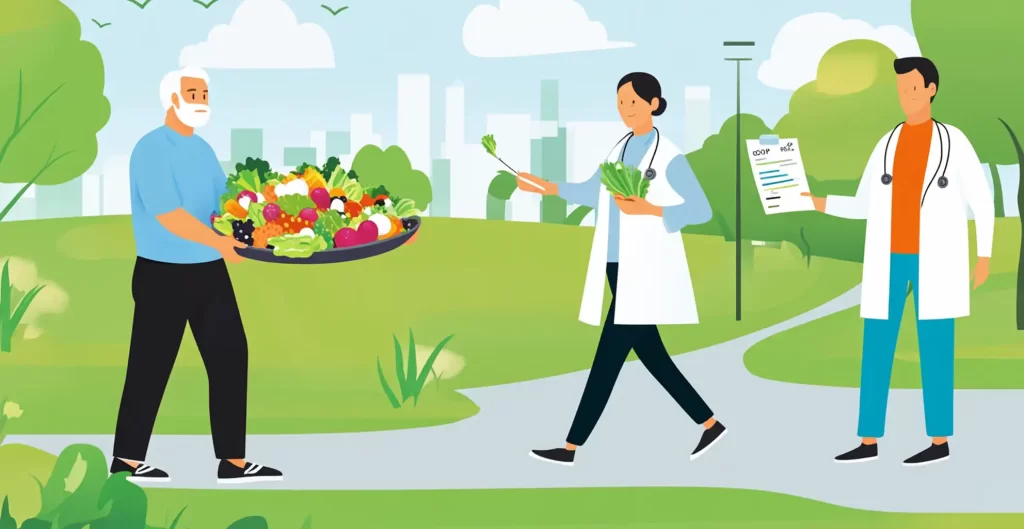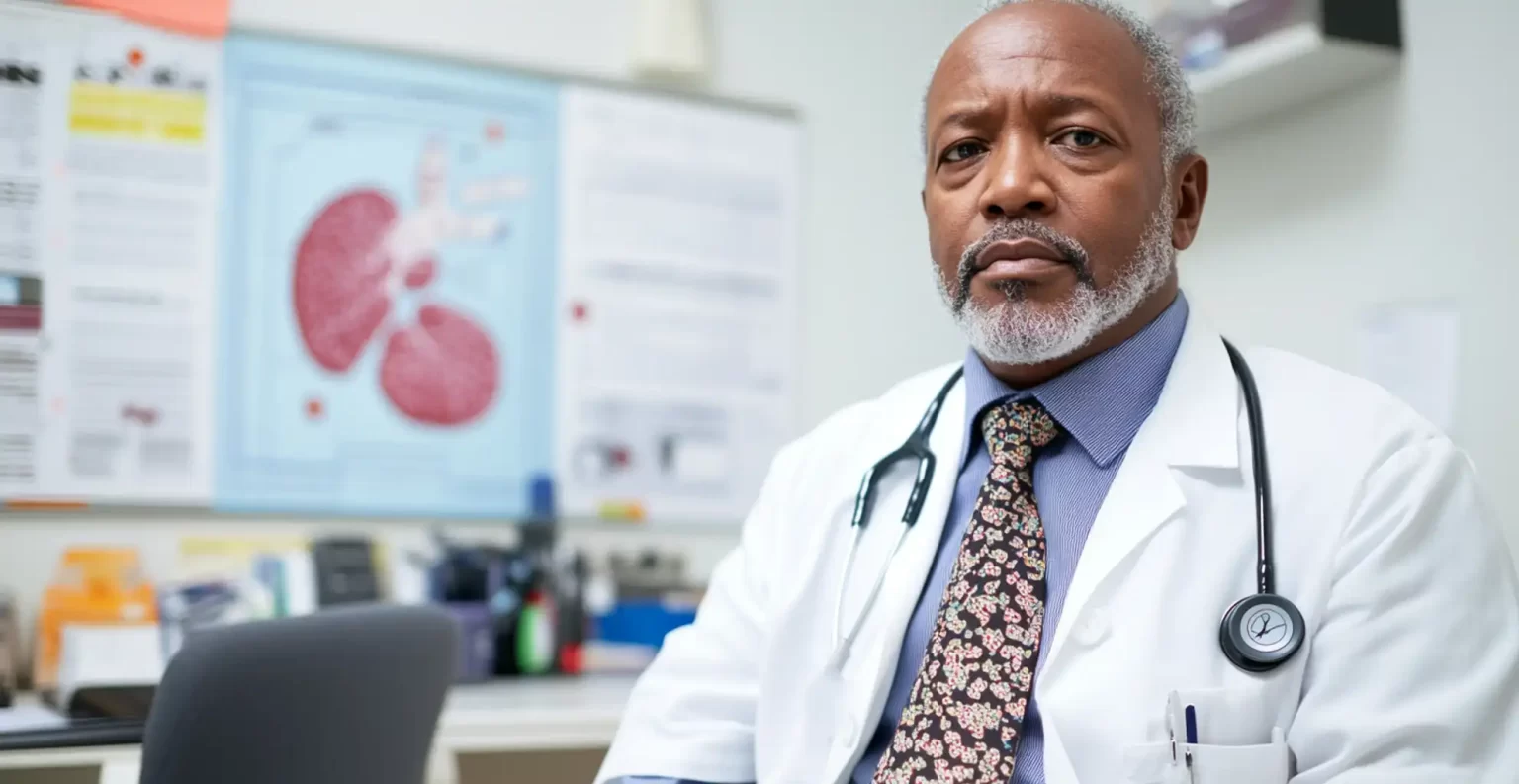Colon cancer is one of the most preventable yet dangerous cancers for people over the age of 50. It’s the third most common cancer worldwide, and the risks increase sharply as you get older. The frightening reality is that many cases go undetected until the disease has progressed to an advanced stage — a risk you can’t afford to take.
After 50, your body’s natural defenses weaken, making it easier for polyps to form in the colon. These polyps can develop into cancer if not detected early. Fortunately, regular screenings and lifestyle changes can make a life-saving difference. By understanding the risks of colon cancer after age 50, you can take proactive steps toward protecting your health and well-being.
🔎 Why Should You Be Concerned?
Many people over 50 don’t experience any symptoms of colon cancer until it’s too late. That’s why doctors recommend routine colonoscopies starting at age 50 — or earlier if you have a family history of the disease. Early detection dramatically improves survival rates, and simple lifestyle changes can reduce your risk.
In this guide, you’ll discover:
✅ The Rising Risks of Colon Cancer After 50: Learn why the risk increases with age and the factors that contribute to it.
✅ Early Warning Signs and Symptoms: Know what to watch for and when to seek medical advice.
✅ Prevention Tips and Screening Recommendations: Learn the steps you can take to reduce your risk and stay ahead of the disease.
Taking action now can save your life. Let’s dive into the details of how to stay protected and reduce your risks.

Why Colon Cancer Risk Increases After 50
The risks of colon cancer after age 50 are significantly higher due to a combination of natural aging processes, genetic predispositions, and lifestyle factors. Understanding why these risks increase can help you take proactive steps to reduce them and prioritize early detection.
🔬 1. How Aging Impacts Colon Health
As the body ages, cellular regeneration slows down, which can impact the colon in several ways. The colon (also called the large intestine) plays a crucial role in removing waste from the body, but over time, the lining of the colon can weaken and become more susceptible to damage.
Here’s how aging affects your colon health:
- Polyps are more likely to form after age 50. These are small growths on the colon lining that can become cancerous if not detected early.
- The immune system weakens, reducing the body’s ability to fight off abnormal cell growth.
- Inflammation in the digestive system increases, which can create an environment where cancer cells thrive.
💡 Key Point:
Regular colonoscopies after age 50 can help detect polyps early, reducing the chances of those polyps turning into cancer.
🧬 2. Genetic Predisposition and Family History
Your genes and family history play a significant role in your risk of developing colon cancer. If you have first-degree relatives (parents, siblings) who have had colon cancer, your risk is up to four times higher compared to someone without a family history of the disease.
Common genetic factors that increase your risk:
- Hereditary Nonpolyposis Colorectal Cancer (HNPCC): Also known as Lynch syndrome, this genetic condition increases the risk of colon cancer at a younger age.
- Familial Adenomatous Polyposis (FAP): A rare genetic disorder that causes numerous polyps to form in the colon and rectum, significantly raising the risk of cancer.
💡 Key Point:
If you have a family history of colon cancer, you may need to start regular screenings before age 50 and consider genetic testing to assess your risk.
🍔 3. Lifestyle Factors That Increase Risk
In addition to genetics and aging, lifestyle choices play a significant role in colon cancer risk. Certain habits and dietary choices can increase inflammation in the colon and promote the growth of cancerous cells.
Here are the key lifestyle factors that increase colon cancer risk:
| Lifestyle Factor | Impact on Colon Health |
|---|---|
| High consumption of red and processed meats | Increases inflammation and promotes polyp growth |
| Low fiber diet | Slows down digestion and increases exposure to toxins |
| Lack of exercise | Contributes to obesity, which is a risk factor for colon cancer |
| Smoking and alcohol | Damages the colon lining and weakens immune defenses |
💡 Key Point:
Adopting a high-fiber diet, reducing red meat intake, and maintaining an active lifestyle can significantly reduce your colon cancer risk.
🩺 4. The Importance of Early Detection Through Screenings
The most effective way to reduce the risks of colon cancer after age 50 is through early detection. Regular screenings, such as colonoscopies, can identify precancerous polyps and remove them before they turn into cancer.
✅ Why Screenings Matter:
- Colonoscopies can detect cancer in its early stages, when it is most treatable.
- Stool tests can identify hidden blood in the stool, which may be an early sign of cancer.
- CT colonography (virtual colonoscopy) provides a less invasive screening option.
📅 Recommended Screening Timeline:
| Age | Screening Frequency |
|---|---|
| 50-75 | Every 10 years for a colonoscopy |
| 76-85 | Discuss screening frequency with your doctor |
| Younger than 50 | Start screenings earlier if you have a family history |
💡 Key Point:
Catching colon cancer before symptoms appear can dramatically improve survival rates. The five-year survival rate is over 90% when the disease is detected early.
🔑 Summary of Why Colon Cancer Risk Increases After 50:
| Risk Factor | How It Increases Risk |
|---|---|
| Aging | Slows cellular repair and increases polyp formation |
| Genetic Predisposition | Family history increases cancer risk |
| Lifestyle Choices | Poor diet, inactivity, and smoking raise colon cancer risk |
| Delayed Screenings | Many people over 50 skip regular colonoscopies |
By understanding these risk factors, you can take the necessary steps to protect yourself through lifestyle changes and early screenings. Early detection and prevention are your best defenses against colon cancer after age 50.
Early Signs and Symptoms of Colon Cancer
Colon cancer is often referred to as a “silent killer” because it can develop without noticeable symptoms in its early stages. However, recognizing the early signs and symptoms of colon cancer can make a significant difference in catching the disease before it progresses. Being aware of these warning signs, especially after age 50, can help you seek medical attention early and improve your chances of successful treatment.
⚠️ 1. Blood in the Stool (Rectal Bleeding)
One of the most common and early warning signs of colon cancer is blood in the stool or rectal bleeding. This may appear as:
- Bright red blood on toilet paper.
- Dark or black stools, indicating digested blood.
- Blood mixed within the stool, which may not always be visible.
💡 Important:
While blood in the stool can also be caused by hemorrhoids or minor digestive issues, persistent bleeding should never be ignored. Consult a doctor immediately if you notice this symptom.
🚨 2. Changes in Bowel Habits
Sudden, unexplained changes in bowel habits can be a sign of colon cancer. These changes may include:
- Diarrhea that lasts longer than usual.
- Constipation or difficulty passing stools.
- Narrow or ribbon-like stools, which could indicate a blockage in the colon.
- Incomplete bowel movements, where you feel like you haven’t fully emptied your bowels.
💡 Key Point:
If you experience any of these changes for more than a few weeks, it’s important to get checked by a healthcare provider.
🏋️ 3. Unexplained Weight Loss and Fatigue
Unintentional weight loss without changes in diet or exercise is a potential red flag. Colon cancer can cause chronic inflammation, which affects the body’s ability to absorb nutrients and leads to weight loss. Additionally, cancer cells consume the body’s energy, causing persistent fatigue.
Look out for:
- Sudden weight loss without dieting.
- Feeling exhausted even after resting.
- Low energy levels that affect daily activities.
💡 Important:
These symptoms may not appear until the cancer has progressed, so regular screenings are essential to catch cancer early.
🧪 4. Persistent Abdominal Discomfort
Colon cancer can cause ongoing abdominal discomfort due to inflammation or a blockage in the colon. This discomfort can manifest as:
- Cramping or bloating that doesn’t go away.
- Frequent gas pains.
- Feeling full or bloated even after a small meal.
💡 Key Point:
If you experience these symptoms regularly, it’s important to consult a healthcare provider to rule out serious conditions.
🔄 5. Changes in Stool Appearance
Changes in the appearance or consistency of your stool can indicate issues in the colon, including cancer. Common changes to watch for include:
- Thinner stools (like a pencil).
- Mucus in the stool.
- Frequent stools that are loose or watery.
💡 Important:
These changes can also be caused by diet, stress, or other medical conditions, but persistent changes should be evaluated by a doctor.
📉 6. Feeling of Incomplete Emptying
If you often feel like you haven’t fully emptied your bowels, even after a bowel movement, it could be a sign of a tumor obstructing the colon.
This symptom is often described as:
- Tenesmus: A constant feeling of needing to pass stool, even if the bowel is empty.
💡 Key Point:
This sensation is different from regular constipation and should not be ignored if it happens frequently.
🔑 Summary of Early Signs and Symptoms:
| Symptom | What to Watch For |
|---|---|
| Blood in the stool | Bright red blood, dark stools, or blood within the stool |
| Changes in bowel habits | Persistent diarrhea, constipation, or narrow stools |
| Unexplained weight loss | Weight loss without changes in diet or activity levels |
| Persistent fatigue | Feeling tired even after resting |
| Abdominal discomfort | Cramping, bloating, or gas pains |
| Changes in stool appearance | Thinner stools or mucus in the stool |
| Feeling of incomplete emptying | Persistent feeling of needing to pass stool |
🩺 When to See a Doctor
You should seek medical attention immediately if you experience any of the following:
- Blood in your stool.
- Sudden changes in bowel habits lasting more than 2-3 weeks.
- Unexplained weight loss or fatigue.
- Persistent abdominal pain.
💡 Pro Tip:
Many of these symptoms can be caused by non-cancerous conditions, but it’s better to be safe and get screened early. Regular colonoscopy screenings after age 50 are your best defense against colon cancer.
Early Signs and Symptoms of Colon Cancer
Colon cancer is often difficult to detect in its early stages because symptoms may be subtle or easily overlooked. However, recognizing the early signs can be life-saving, especially for individuals over the age of 50. Below are some of the most common early symptoms of colon cancer, along with tips on when to seek medical advice.
⚠️ 1. Blood in the Stool (Rectal Bleeding)
One of the most alarming early signs of colon cancer is blood in the stool, which may appear in different forms:
- Bright red blood on toilet paper or in the toilet bowl.
- Dark, tarry stools, which indicate digested blood from higher up in the colon.
- Blood mixed within the stool, which may not always be visible to the naked eye.
💡 Tip:
Occasional rectal bleeding can result from less serious conditions like hemorrhoids or anal fissures, but persistent or unexplained bleeding should never be ignored. If you notice blood in your stool more than once, schedule an appointment with your doctor immediately.
🔄 2. Changes in Bowel Habits
Sudden and persistent changes in bowel habits can also be an early warning sign of colon cancer. These changes may include:
- Diarrhea or constipation that lasts for several weeks.
- Narrow, pencil-thin stools, which may indicate a blockage in the colon.
- Frequent bowel movements that feel incomplete.
💡 Tip:
If you notice persistent changes in your bowel habits that last for more than two weeks, it’s time to consult a doctor. These changes could indicate a blockage caused by a polyp or tumor.
⚖️ 3. Unexplained Weight Loss or Fatigue
Colon cancer can cause unexplained weight loss, even if you haven’t changed your diet or activity level. This happens because:
- The cancer may be using up your body’s energy.
- Tumors can cause inflammation that affects how your body absorbs nutrients.
Additionally, persistent fatigue can occur as your body works harder to fight off the disease.
💡 Tip:
If you lose more than 5% of your body weight within six months without any explanation, or if you feel constantly fatigued, it’s time to see a doctor. This could be a sign of cancer or another underlying health issue.
🤕 4. Persistent Abdominal Discomfort
Colon cancer can cause ongoing abdominal discomfort, including:
- Cramping or bloating that doesn’t go away.
- Gas pains or stomach pain after meals.
- A feeling of fullness even after eating small portions.
This discomfort can occur if a tumor blocks part of the colon, causing a build-up of waste.
💡 Tip:
While occasional digestive discomfort is normal, persistent or severe abdominal pain should be evaluated by a doctor. Blockages or growths in the colon can lead to more serious complications if left untreated.
🩺 When to Seek Medical Advice
It’s important to see a doctor if you experience any of the following symptoms for more than two weeks:
- Blood in the stool or rectal bleeding.
- Sudden, persistent changes in bowel habits.
- Unexplained weight loss or extreme fatigue.
- Persistent abdominal pain or discomfort.
💡 Proactive Tip:
Even if you don’t have symptoms, you should still schedule regular colonoscopies after age 50. Many cases of colon cancer are found through routine screenings before symptoms even appear.
🔑 Summary of Early Warning Signs:
| Symptom | What to Watch For |
|---|---|
| Blood in the stool | Bright red blood, dark stools, or blood mixed with the stool |
| Changes in bowel habits | Persistent diarrhea, constipation, or narrow stools |
| Unexplained weight loss | Losing weight without changes in diet or activity |
| Persistent fatigue | Feeling tired or drained despite getting enough rest |
| Abdominal discomfort | Ongoing cramping, bloating, or stomach pain |

Preventative Measures to Reduce Colon Cancer Risk
The good news is that colon cancer is preventable. By making healthy lifestyle changes and undergoing regular screenings, you can significantly reduce your risk of developing colon cancer after age 50.
📅 1. Regular Colonoscopies After Age 50
One of the most effective preventative measures is to schedule regular colonoscopies starting at age 50. A colonoscopy allows doctors to detect and remove polyps (small growths) before they become cancerous.
✅ How Often to Get Screened:
- Every 10 years for most people starting at age 50.
- More frequently if you have a family history of colon cancer or other risk factors.
💡 Tip:
Talk to your doctor about alternative screening methods like stool tests or CT colonography if you prefer a less invasive option.
🥗 2. Maintain a Healthy Diet Rich in Fiber, Fruits, and Vegetables
A high-fiber diet is essential for keeping your colon healthy. Fiber helps move waste through the digestive tract more quickly, reducing the time harmful substances remain in contact with the colon lining.
✅ Best Foods for Colon Health:
- Whole grains like oats, brown rice, and quinoa.
- Fruits like apples, berries, and oranges.
- Vegetables like broccoli, spinach, and carrots.
- Legumes like beans, lentils, and chickpeas.
💡 Tip:
Aim for 25-35 grams of fiber per day to reduce your risk of colon cancer.
🏃 3. Stay Physically Active
Regular physical activity can lower your risk of colon cancer by:
- Improving digestion.
- Reducing inflammation.
- Helping you maintain a healthy weight.
✅ Best Exercises for Colon Health:
- Walking or jogging for at least 30 minutes a day.
- Strength training to build muscle and boost metabolism.
- Yoga and stretching to improve digestion and reduce stress.
💡 Tip:
Even light daily activities like gardening, cleaning, or dancing can help reduce your risk.
🚫 4. Limit Alcohol and Quit Smoking
Quitting smoking and reducing alcohol intake are two of the most powerful lifestyle changes you can make to reduce your colon cancer risk.
✅ How to Reduce Alcohol and Quit Smoking:
- Set realistic goals to gradually reduce alcohol intake.
- Seek support from friends, family, or a smoking cessation program.
- Replace smoking or drinking habits with healthier alternatives like exercise or hobbies.
💡 Tip:
Your risk of colon cancer decreases as soon as you quit smoking and limit alcohol. The longer you stay smoke-free and reduce alcohol intake, the lower your risk becomes.
🔑 Summary of Preventative Measures:
| Preventative Measure | How It Reduces Risk |
|---|---|
| Regular colonoscopies | Detects and removes polyps before they turn cancerous |
| High-fiber diet | Speeds up digestion and reduces exposure to toxins |
| Physical activity | Improves overall colon health and reduces inflammation |
| Limit alcohol and quit smoking | Reduces inflammation and eliminates carcinogens |
Conclusion: Reducing the Risks of Colon Cancer After Age 50
Colon cancer is a serious health concern, particularly for individuals over 50. The good news? It’s preventable. By making informed lifestyle choices, recognizing the early signs, and undergoing regular screenings, you can significantly reduce your risk and improve your overall colon health.
✅ Key Takeaways:
- Why Colon Cancer Risk Increases After 50:
Aging, genetics, and lifestyle choices contribute to a higher risk after age 50. - Early Signs and Symptoms:
Watch for blood in the stool, persistent bowel changes, and unexplained weight loss. - Preventative Measures:
Regular colonoscopies, a high-fiber diet, and healthy lifestyle changes can lower your risk.


1 thought on “Risks of Colon Cancer After Age 50: What You Need to Know”